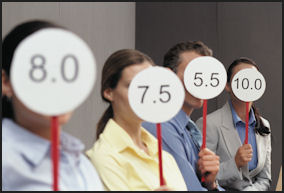
5.5 – really? REALLY? Let’s see if your car doesn’t have a banana in the exhaust, buddy.
At some point in our careers, we are all going to undergo some sort of evaluation. Every job setting has it’s own way of allowing management to evaluate employee performance. One common way to gauge performance is through a subjective performance evaluation. This kind of evaluation is generally reserved for positions that have an aspect that is not measurable.
For example, sales. You may be a star salesperson, and have numbers of closed deals through the roof, but how loyal are your customers? That is a criteria that cannot be measured. The same holds true for customer service. There is no straight-forward way to quantify how happy your customers are at any given moment
So What is The Subjective Performance Evaluation?
I like to think of this type of evaluation as being entirely opinion based. Unlike an objective evaluation (which uses hard facts and numbers), there are no measurable criteria for a subjective performance evaluation. While not an exhaustive list, here are a few examples of criteria that may be found:
- Personality. What type of person are you? Honest? Dependable? Helpful?
- Attitude. How do you treat others? Are you optimistic or pessimistic?
- Appearance. Do you dress appropriately for your job? Do you have good personal hygiene?
- Social interaction. How well do you work with others? Are you a team player or more independent? This can even overflow to outside the office-are you a good representative of the company while out in public?
- Initiative. Do you take action on your own or have to be told every move to make?
- Communication. How well do you deliver your message either written or verbally? Are you clear and easily understood?
Your supervisor will usually rate you in each category on a scale that ranges from poor to excellent. Keep in mind, this is just how they perceive you and not how you actually are.
Let The Good Be Known
With this type of evaluation, your supervisor can give you their input as to your performance in each area, as well as on how you may improve your score in each criteria. Clear cut examples can be given for each criteria based on past performance or desired outcomes. A detailed action plan based upon your evaluation will allow you focus with laser like intensity on how to improve your job performance.
Now, The Bad News

And another thing – turkey jerky is so NOT anything like beef jerky just because they share a common word. Sheesh.
The major weak point here is that your entire evaluation is based solely on the opinion of one person. What if your boss feels threatened by you? What if they don’t support the same charities as you? Any disagreement between you and the evaluator could skew your evaluation negatively based on anything but job performance.
This subjective evaluation process can also place workers at greater risk for discrimination based on race, religion, gender, marital status, or disability. This is the reason most companies do not rely on subjective evaluations alone as they very well could lead to excessive legal action.
Best Practices And Your Future
One of the best ways to ensure and you do as well as possible on a subjective employee evaluation is to read your companies employee handbook. In most cases, each criteria will be spelled out in great detail as to what the company expects from it’s employees. If any areas seem vague do not hesitate to ask your supervisor.
Asking the right questions will not only clarify what the company is looking for in the situation, but this will also convey to your supervisor that you are willing to learn and try to meet or exceed expectations. You can start putting some objective results to your subjective qualities by using some of the free tools here.